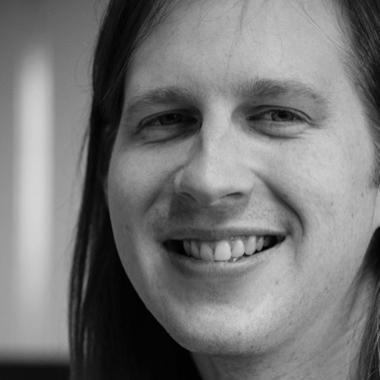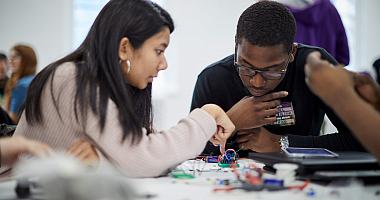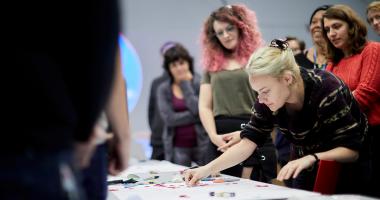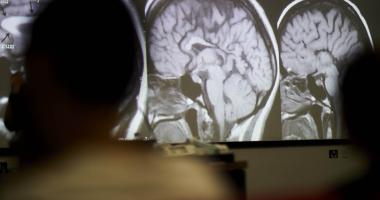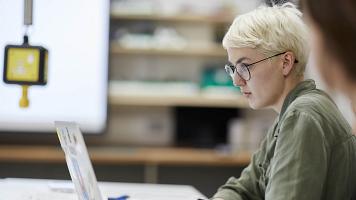BSc (Hons)
Computer Science
Get prepared for the technology jobs of the future. You'll master in-demand programming, computing and mathematical skills through project-based modules where you'll develop your own software.
Content navigation menu
Why study BSc Computer Science at Goldsmiths
- The degree prepares you for a range of careers across the tech industry, such as software engineer, technology consult and data scientist. It covers key technical skills such as algorithmic thinking, full-stack web development, and machine learning, as well as industry-relevant soft skills like project management frameworks, user-centred design, and digital venture creation.
- The degree is hands-on and practical from the start. You'll be creating your own web and mobile applications, data visualisations, and games. You will explore your potential through these practical projects while learning relevant technical skills for your future career.
- In your third year, you'll have the opportunity to undertake a year-long industry placement (making this programme four years full-time, or seven years part-time). This gives you valuable experience to build confidence and contacts, further develop your skills and industry insight, and enhance your career prospects.
- We will teach you the skills you need for software engineering, but you don’t need to know how to code before you start. We begin from the basics and bring you up to a professional level over the course of your degree.
- You’ll program in multiple languages, use industry-standard tools, learn about analytical skills and problem-solving strategies, and explore topics such as machine learning, data mining, and artificial intelligence. You will also develop professional working practices such as design documentation, testing cycles, version control and issue tracking.
- By the end of your degree, you’ll have built a portfolio of work to kickstart your career in the technology industry.
Contact the department
If you have specific questions about the degree, contact Dr Edward Anstead.
UCAS code
G400
Entry requirements
A-level: BBB
BTEC: DDM
IB: 33 points overall with Three HL subjects at 655
Length
3 years full-time; 4 years full-time with a placement year; 6-8 years part-time
Fees
Home - full-time: £9250
Home - part-time: £4625
International - full-time: £20160
Department
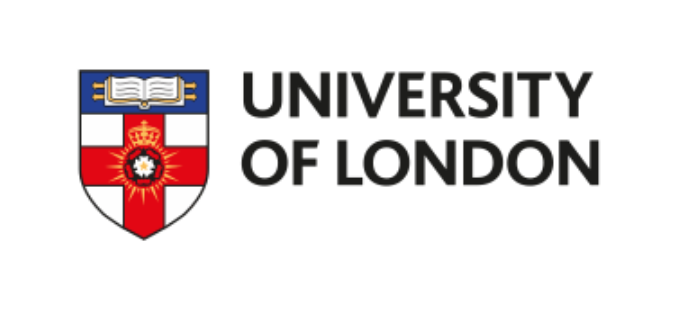
Goldsmiths works in partnership with the University of London Worldwide on a distance learning version of this programme. Find out more on the University of London course page.
Computer Science pathways
As well as this BSc Computer Science degree, we offer several pathways that allow you to focus on the following specialisms:
- BSc (Hons) Computer Science (Artificial Intelligence & Data Science)
- BSc (Hons) Computer Science (Cybersecurity)
- BSc (Hons) Computer Science (Software Engineering)
- BSc (Hons) Computer Science (User Experience)
If you decide to take this BSc Computer Science degree without a pathway, you'll develop a general understanding of a range of foundational topics, including software development and engineering, algorithms, and computer architecture.
You may consider this option if you haven't decided where your interests in computer science lie and want to have the widest understanding of the discipline. As you approach the latter part of your degree, you'll be able to choose advanced optional modules based on your experiences so far and your personal interests.
Watch videos about your course
What you'll study
Year 1
In your first year, you'll take the following compulsory modules:
| Module title | Credits |
|---|---|
| Introduction to Programming | 15 credits |
| User Experience and the Web | 15 credits |
| Logic and Computer Architecture | 15 credits |
| Computing Project 1 | 15 credits |
| Graphics 1 | 15 credits |
| Algorithms 1 | 15 credits |
| Identity, Agency & Environment 1 | 15 credits |
| Identity, Agency & Environment 2 | 15 credits |
Note about optional modules (if available): The above is indicative of the typical modules offered, but is not intended to be construed or relied on as a definitive list of what might be available in any given year. The module content and availability is subject to change.
Teaching style
This programme is taught through a mixture of lectures, tutorials, workshops and laboratory sessions. You’ll also be expected to undertake a significant amount of independent study. This includes carrying out required and additional reading, preparing topics for discussion, and producing essays or project work.
How you'll be assessed
You’ll be assessed by a variety of methods, depending on your module choices. These may include coursework, examinations, group work and projects. If you opt for an industrial placement year, your placement tutor will assess your work. If you complete the placement year successfully, you earn the endorsement 'with work experience' on your degree certificate.
Credits and levels of learning
An undergraduate honours degree is made up of 360 credits – 120 at Level 4, 120 at Level 5 and 120 at Level 6. If you are a full-time student, you will usually take Level 4 modules in the first year, Level 5 in the second, and Level 6 modules in your final year.
Facilities
The Department of Computing has a wealth of specialist labs and facilities that enable students and academics to create cutting-edge work.
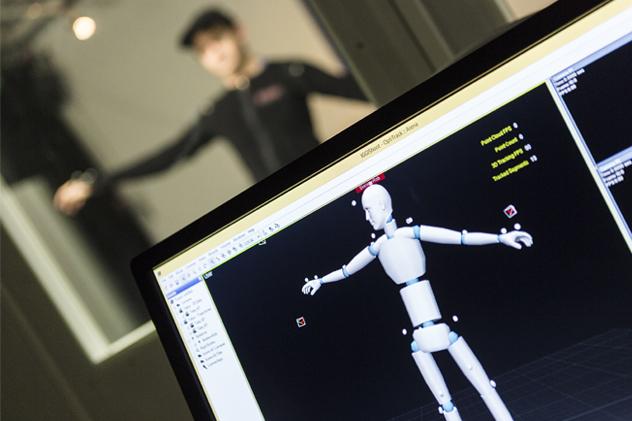
Computing facilities at Goldsmiths include a VR lab equipped with a full multi-camera motion capture studio, similar to that used in the making of Avatar and The Last of Us.
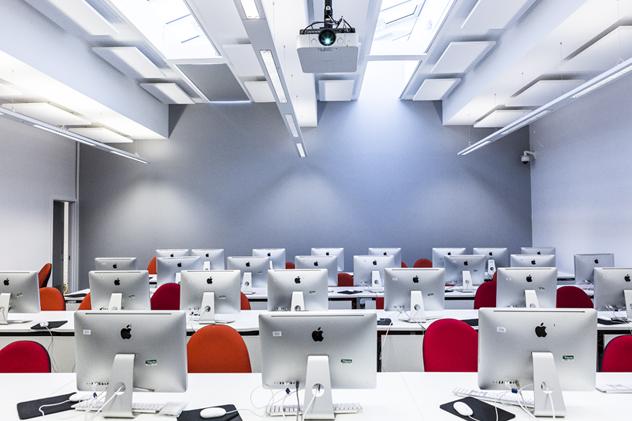
The Goldsmiths computer suites are equipped with more than 200 iMacs running Windows 10 and MacOS in parallel.
Careers
The explosive and ever-growing use of technology in business and enterprise means that there are a whole range of different career possibilities for computer science graduates.
In terms of job opportunities and salaries, the IT sector is well ahead of most other industrial and commercial sectors.
Where do Goldsmiths computing graduates work?
Some of the recent graduate-level careers for computing alumni have included:
- Software engineer
- Data analyst
- Machine learning developer
- User interface/user experience designer
- Mobile developer
- Full-stack web developer
- E-learning programmer
- Application programmer
- App developer
- Video game developer
- Film special effects and post-production
- Computer music/sound engineer
- Database manager
Employers include:
The pace of change in the computing sector is rapid, and you may be pursuing careers and using digital methods we cannot yet imagine. You can read more about possible career options after you graduate on our computing careers page.
This programme is also a pathway into Masters-level study in a variety of computing disciplines.
Skills
Throughout the degree you will learn skills including:
- Programming skills, including those required to design and build business computing systems for internet and mobile environments
- An understanding of the fundamental methods, theories, techniques and technologies relating to the development of software-based systems
- Critical, analytical, creative, reflective and interpersonal skills that will prepare you for a career in industry or research, including the ability to work independently and in groups
- An understanding of contemporary computing practice
- An awareness of the impact of your work, and the wider role computing technology plays in society
- The mathematical and computational principles underlying computing
- Computational problem solving
- Project management
- Teamwork and collaboration
You'll be supported throughout the programme to understand the different potential career journeys you can follow, and to build a portfolio of work to demonstrate your capability to gain employment or freelance work in that area.
Regular guest lectures from industry support the development of sector knowledge and awareness of different career paths.
Industrial placement year
If you decide to take the industrial placement year, you will develop the practical skills and real-world experience that is sought after by employers.
Some of the companies students have worked at during their work placement year recently include:
University of London Distance Learning
If you are studying this programme via Distance Learning through the University of London, you may be able to transfer to the campus-based programme. Please visit the BSc Computer Science (transfer from University of London) page for more information.
Entry requirements
We accept the following qualifications:
A-level: BBB
BTEC: DDM
International Baccalaureate: 33 points overall with Three HL subjects at 655
Access: Pass with 45 Level 3 credits including 30 Distinctions and a number of merits/passes in subject-specific modules
Scottish qualifications: BBBBC (Higher) or BBC (Advanced Higher)
European Baccalaureate: 75%
Irish Leaving Certificate: H2 H2 H2 H2
Additional requirements
If you do not have a Science or Mathematics-based A-level, you should normally have at least Grade B/Grade 6 at GCSE Mathematics.
Transfers
If you are a University of London student of Computing you may transfer onto the second or third year of this degree.
Alternative qualifications and experience
See our full list of undergraduate entry qualifications.
We welcome students with a range of educational experiences. If you believe you may not meet the standard qualification requirements we would still encourage you to apply because we consider all aspects of your application when making a decision.
We’ll pay particularly careful attention to your personal statement, which is your opportunity to demonstrate your interest in the subject you’ve applied for. Your referees are also welcome to include any relevant contextual comments around your academic achievements. We’ll look at all these things when making a decision on your application, as well as your qualifications and grades.
International qualifications
We also accept a wide range of international qualifications. Find out more about the qualifications we accept from around the world.
If English isn’t your first language, you will need an IELTS score (or equivalent English language qualification) of 6.0 with no element lower than 5.5 to study this programme. If you need assistance with your English language, we offer a range of courses that can help prepare you for degree-level study.
Fees and funding
Annual tuition fees
These are the UG fees for students starting their programme in the 2024/2025 academic year.
From August 2021 EU/EEA/Swiss nationals will no longer be eligible for 'Home' fee status. EU/EEA/Swiss nationals will be classified as 'International' for fee purposes, more information can be found on our fees page.
- Home - full-time: £9250
- Home - part-time: £4625
- International - full-time: £20160
If your fees are not listed here, please check our undergraduate fees guidance or contact the Fees Office, who can also advise you about how to pay your fees.
It’s not currently possible for international students to study part-time if you require a Student Visa, however this is currently being reviewed and will be confirmed in the new year. Please read our visa guidance in the interim for more information. If you think you might be eligible to study part-time while being on another visa type, please contact our Admissions Team for more information.
If you are looking to pay your fees please see our guide to making a payment.
Funding opportunities
We offer a wide range of scholarships and bursaries, and our Careers Service can also offer advice on finding work during your studies. Find out more about funding your studies with us.
Additional costs
In addition to your tuition fees, you'll be responsible for any additional costs associated with your course, such as buying stationery and paying for photocopying. You can find out more about what you need to budget for on our study costs page.
There may also be specific additional costs associated with your programme. This can include things like paying for field trips or specialist materials for your assignments. Please check the programme specification for more information.
Placement year
If you choose to do a placement year, the fee for this year will be different to that listed. Please contact the Fees Office for details.
